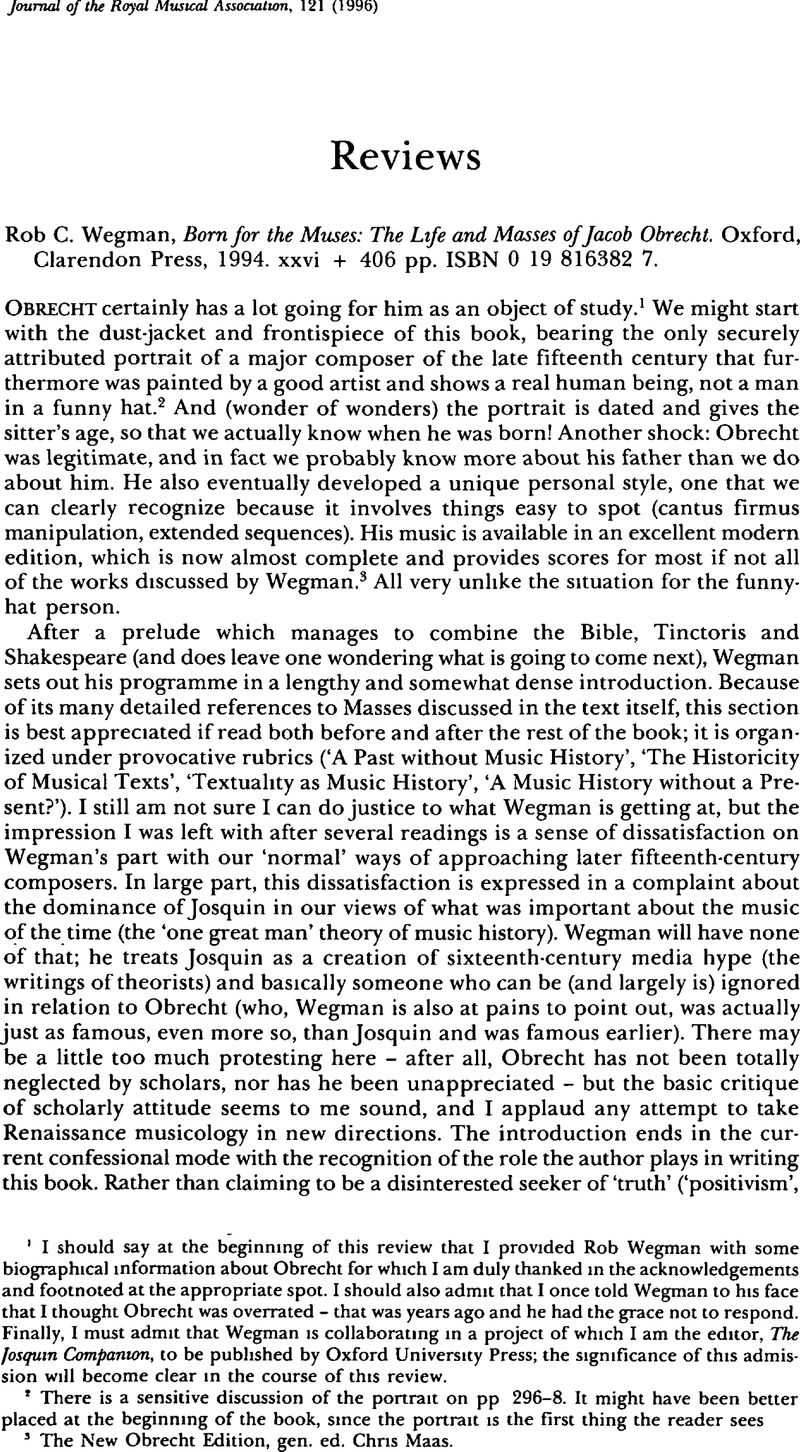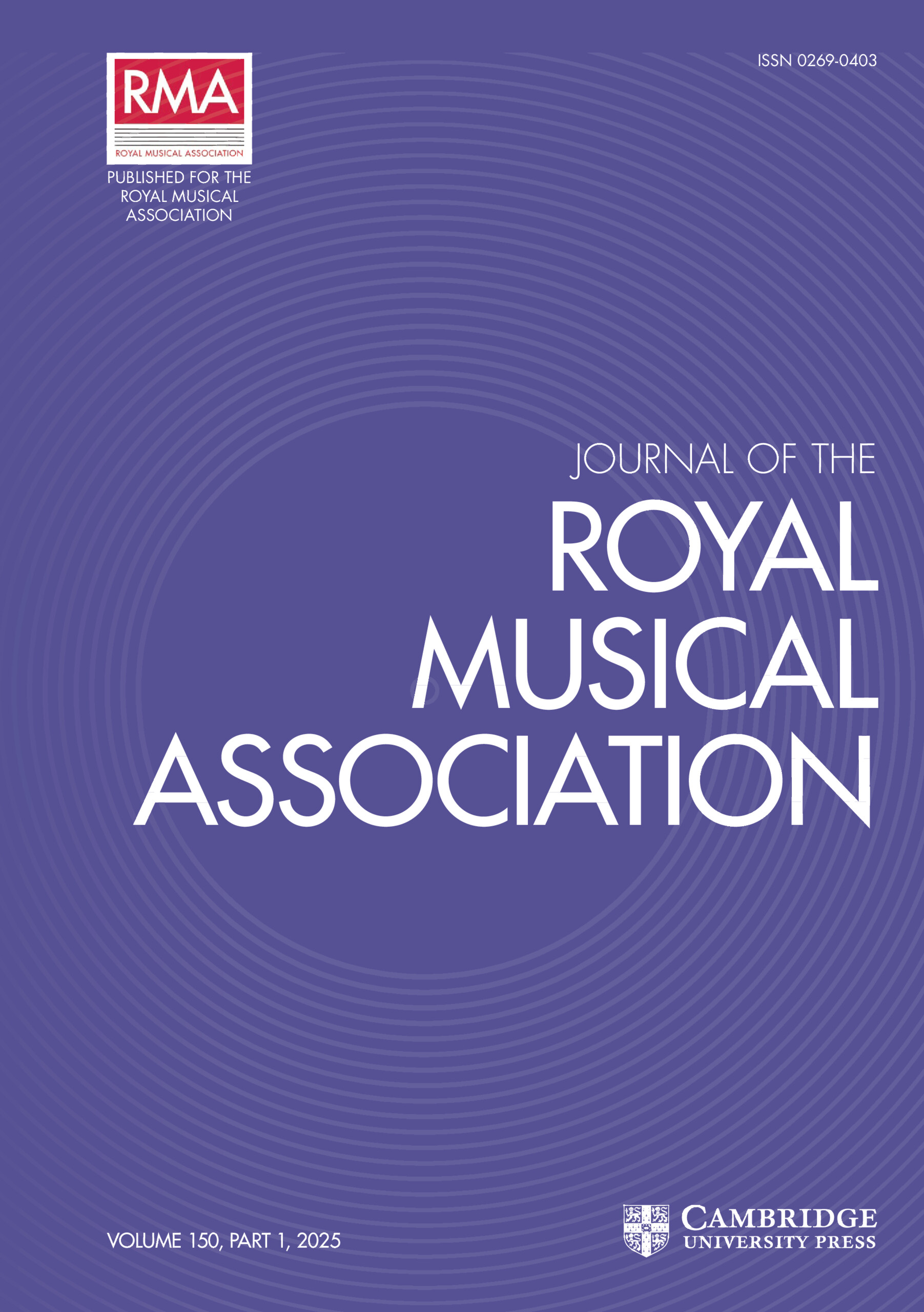No CrossRef data available.
Article contents
Rob C. Wegman, Born for the Muses: The Life and Masses of Jacob Obrecht. Oxford, Clarendon Press, 1994. xxvi + 406 pp. ISBN 0 19 816382 7.
Review products
Published online by Cambridge University Press: 01 January 2020
Abstract

- Type
- Reviews
- Information
- Copyright
- Copyright © Royal Musical Association, 1996
References
1 I should say at the beginning of this review that I provided Rob Wegman with some biographical information about Obrecht for which I am duly thanked in the acknowledgements and footnoted at the appropriate spot. I should also admit that I once told Wegman to his face that I thought Obrecht was overrated – that was years ago and he had the grace not to respond. Finally, I must admit that Wegman is collaborating in a project of which I am the editor, The Josquin Companion, to be published by Oxford University Press; the significance of this admission will become clear in the course of this review.Google Scholar
2 There is a sensitive discussion of the portrait on pp 296–8. It might have been better placed at the beginning of the book, since the portrait is the first thing the reader seesGoogle Scholar
3 The New Obrecht Edition, gen. ed. Chris Maas.Google Scholar
4 ‘In the church there were no limitations to upward mobility, except in terms of one's own intellectual ability and political skills If, some time in the mid 1460s, it was decided that Jacob be trained for the priesthood, this was surely not with the intention that he should eventually lead the life that he did, but that he should rise above the social position of his father’ (p. 46).Google Scholar
5 Murray, Bain, ‘New Light on Jacob Obrecht's Development – A Biographical Study’, Musical Quarterly, 43 (1957), 500–16 (p 515)Google Scholar
6 See The New Obrecht Edition, viii, ed. Barton Hudson, p xviiGoogle Scholar
7 The man who should have been the most influential musical figure in the area at the time Obrecht was growing up, Du Fay, seems to have had no influence whatsoever on Obrecht's music.Google Scholar
8 Although we are still apparently figuring things out – see Blackburn, Bonnie J, ‘Obrecht's Missa Je ne demande and Busnoys's Chanson An Essay in Reconstructing Lost Canons’, Tijdschrift van de Koninklijke Vereniging voor Nederlandse Muziek Geschiedenis, 45 (1995), 18–31.CrossRefGoogle Scholar
9 As Greenblatt puts it in his book Shakespearean Negotiations. The Circulation of Social Energy in Renaissance England (Berkeley, 1988), 5: ‘If the textual traces in which we take interest and pleasure are not sources of numinous authority, if they are the signs of contingent social practices, then the questions we ask of them cannot profitably center on a search for their untranslatable essence Instead, we can ask how collective beliefs and experiences were shaped, moved from one medium to another, concentrated in manageable aesthetic form, offered for consumption. We can examine how the boundaries were marked between cultural practices understood to be art forms and other contiguous forms of expression. We can attempt to determine how these specially demarcated zones were invested with the power to confer pleasure or excite interest or generate anxiety The idea is not to strip away and discard the enchanted impression of aesthetic autonomy but to inquire into the objective conditions of this enchantment, to discover how the traces of social circulation are effaced. I have termed this general enterprise – the study of the collective making of distinct cultural practices and inquiry into the relations among those practices – a poetics of culture.‘Google Scholar
10 But I am sure someone will tell me I am wrong about this. See Long, Michael, ‘Symbol and Ritual in Josquin's Missa di Dadi’, Missa di Dadi 42 (1989), 1–22.Google Scholar
11 See Strohm, Reinhard, Music in Late Medieval Bruges (Oxford, 1985), 40Google Scholar
12 Jacobus Obrecht Opera omnia editto altera, ed Albertus A Smijers (Amsterdam, 1953), 127 Smijers gives ‘Qui tollis peccata mundi suscipe’ etc. at this point.Google Scholar




